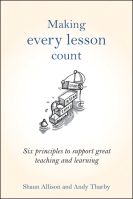
The recent Durrington INSET days and their focus on tacking education disadvantage left me reflecting on my practice. Whilst listening to the speakers, fate found me the target of a question posed directly at me, by one of the presenters. While thinking about our disadvantaged students “Which student in your class embodies perseverance?” Upon giving my reply, I found myself at the mercy of a follow up question, “Had I acknowledged that student’s perseverance and nominated them for recognition?” At that point I was forced to concede with myself that I hadn’t. I had allowed them to fall into the background, as they often do.
Often In science, particularly in my physics specialism, students arrive at my lesson with schema and perceptions of the subject already formed by outside influences. Furthermore, TV programmes and other media often portray physics as a subject for the intellectual elite and as such students often arrive at my lesson with a defeatist mentality – that the subject of the Einsteins and the Sheldon Coopers of this world is far beyond the reach of the humble Durrington student. That the calculations required are like hieroglyphics – impossible to understand. This can be terribly daunting for many students, but particularly our most vulnerable students. If I am to try and improve students’ understanding of the subject and the learning behaviours required to be successful, I have to learn how to understand issues regarding students self-efficacy.
Through a workshop run by Chris Runeckles, I was introduced to the idea of self-efficacy. Bandura defines self-efficacy as “an individual’s belief in his or her capacity to execute behaviours necessary to produce specific performance attainments” – it’s about their confidence in their own ability to succeed. It’s unreasonable to think that every student who enters my classroom, will leave a budding physicist ready to take on the wonders of the universe. However, by teaching students that their future destinations are not set in stone and that they can determine their own success, I hope that they develop a better sense of belief in their own ability. It’s about broadening their vistas!
4 main factors affecting students’ self-efficacy were identified through the work of Albert Bandura.
Through learning and understanding each of these factors, I have tried to incorporate small changes into my practice that I believe have already shown some impact in my students. Here are my reflections.
Performance outcomes: The past experiences of students will inform their belief of how successful they will be with tackling a new task. Success will instil confidence, failure will undermine their self-belief. To tackle this in my own classroom practice I have been working to establish failure as a building block to success – failure and success are not mutually independent. When modelling an exam question, I have experimented showing wrong answers and asking students to identify what caused me to fall for the traps – did I forget to convert a unit? did I not understand the importance of a particular point emphasised in the question? By doing this, students have learned the importance of identifying common pitfalls, whilst normalising that mistakes are easy to make. The important lesson here is that making mistakes is not as apocalyptic as they may perceive it to be. It’s a normal part of the learning process.
I have also been actively trying to destigmatise failure. When students are completing their starter questions, I actively tell them that I don’t want them to look back and I want them to try and answer them, regardless of if the answer is wrong. I tell them that I much prefer wrong answers over correct answers achieved the wrong way. Doing so has increased my students’ tendencies to give it a go, whilst simultaneously showing students they know more than they think they do and often it is their own confidence preventing them from giving an answer, rather than their intelligence. It has also invertedly shown me where my explanations have led to misconceptions.
This coupled with Pastore’s Perch and the 3, 30, 30 strategies from Doug Lemov’s “Teach like a Champion 2.0”, which I wrote about in a previous blog entry, has really enabled my students to develop their self-efficacy and trained me not to rush to support them to give them time to be in their struggle zone.
Verbal Persuasion: Being reassured that we do have the ability to master certain activities means that students are more likely to tackle the problem with an open mind. Everyone, regardless of student/teacher status, will have increased levels of confidence, when influential people support and encourage them. I recently told my students that my love for Physics started at year 9. To which they replied in amazement that I truly wasn’t some Physics messiah sent to them to teach them about science. That science isn’t some Heaven-sent ability and that it genuinely takes hard work and effort, just like mastery of anything.
I have started to ensure that my feedback is specific and targeted to the student’s specific learning gaps, as well as identifying and commending the logic behind their answers too. Even if a student had failed to calculate the correct number, that their error was rooted in this small issue, and they had successfully interpreted information that they may not have done previously. That they had experienced success where they had previously perceived failure, and that the next steps to ensure perfect execution were these slight adjustments.
I have also started to ensure that the “excellent work” examples displayed on my notice board are work that show examples of corrections and annotations, that the work is not excellent because it is aesthetically beautiful with numerous highlighter streaks and calligraphic subtitles. But excellent work is the result of perseverance, dedication, and persistence.
Vicarious experience: During his keynote address during day one of the INSET, Marc Rowland suggested that students with strong self-efficacy and self-regulation skills should be asked how they achieved their answer. This shows their peers that this knowledge comes from experiences that they too have access to; that the information wasn’t bestowed upon them by birth, but is the product of hard work. In my Year 7 class I have an outstanding student with an incredible pre-existing love for science. Previously, I would often rely on him for correct answers or would occasionally ask him a question to challenge him. But in doing this in front of the class I may have inadvertently deified him as this “upper echelon” of science, knowing answers to questions they had not been taught themselves. As a result, his peers have bestowed upon him the title of Dr Reuben (a further achievement as they still refer to me as Mr Rahman!). To celebrate and share success among the class I have started to ask this student how they know the information, to which he will reply about documentaries and films he has watched, and often other students will remark how they had seen a similar documentary, and if they hadn’t, I will mention or ask where one might find the documentary or programme.
Physiological Feedback: Understanding the mental and physiological state that our students are in will help influence their sense of self-efficacy. Students are naturally less likely to feel confident if they are feeling stressed or anxious, and there will be natural fluctuations of these throughout periods of their school year (or even day!). I recently announced to my Year 11 class that they are due an assessment following the completion of a unit of work. I then spoke to a few students individually who were feeling particularly downtrodden from their last assessment results. I spoke to them about how they would be naturally anxious about their assessments and told them it was okay and normal to feel like this. I also suggested that they should also be excited at the prospect of doing better as they had significantly improved their class effort and motivation since receiving their previous grades. We agreed that they were noticing an increase in their understanding and so to imagine how satisfying it will be for them, when this is reflected in their next assessment score.
While it can be beneficial to try and turn anxiety into motivation, we must understand that we are not there to diagnose nor cure them of any psychological difficulties they may be having – there are other brilliant professionals who can support with this. Sometimes the biggest support we can offer them is to accept that they may need 5 minutes to fully compose themselves prior to tackling a task such as an assessment, or if they are not in school, to email them the lesson to give them the best opportunity to catch up when they are ready to do so.
We cannot prepare our students for every eventuality they may face. What we can do is train them to see that they can achieve most things they put their mind to, with the right level of hard work and effort. We may not teach them everything about our subject, but through giving them high self-efficacy we can ready them to be the best they can be for the world beyond school.
Science Teacher & Research School Associate










